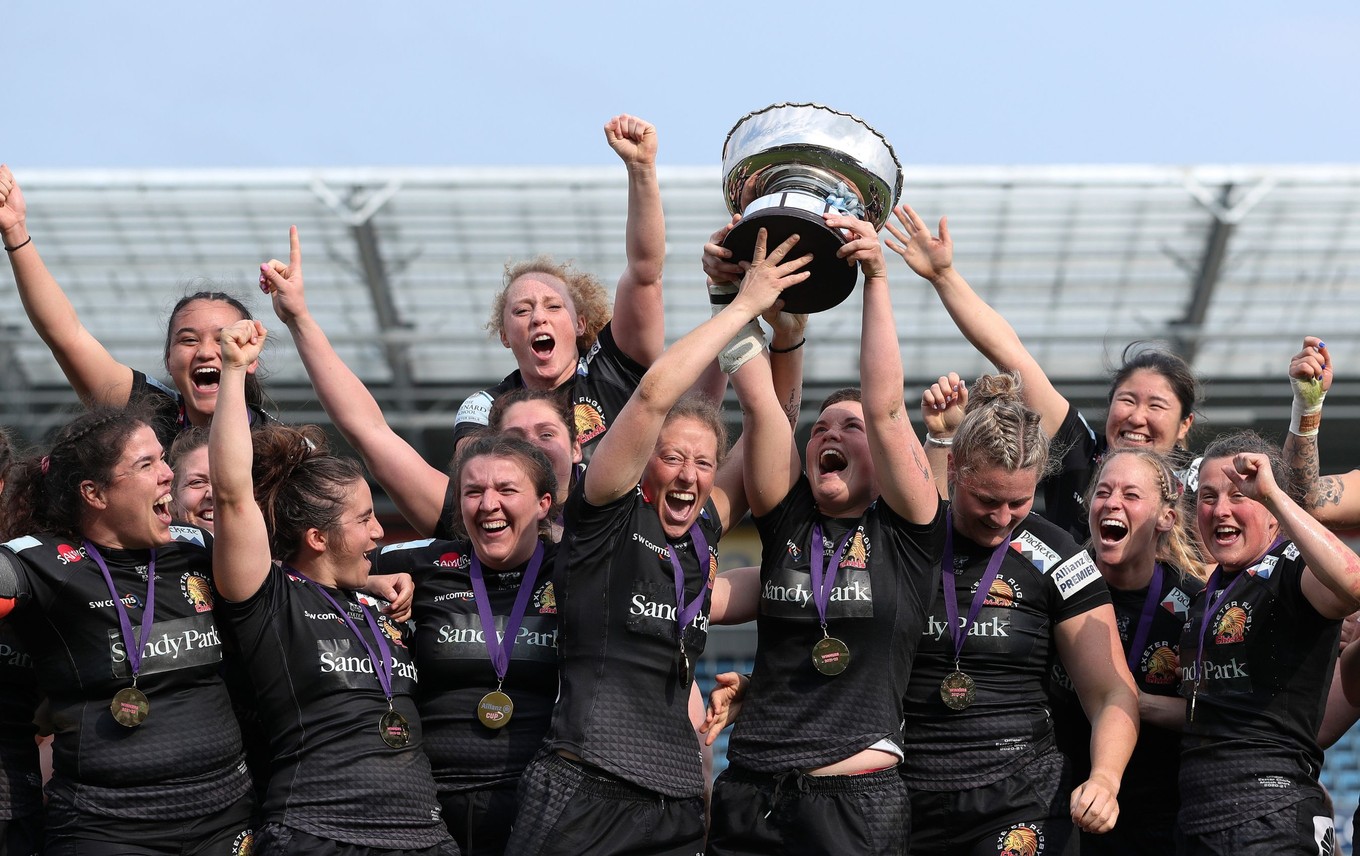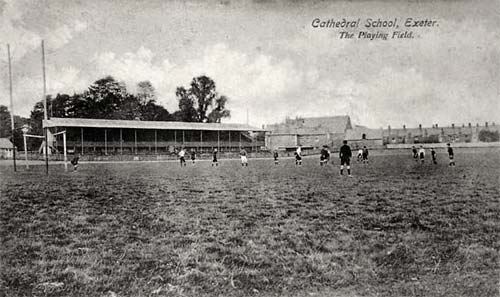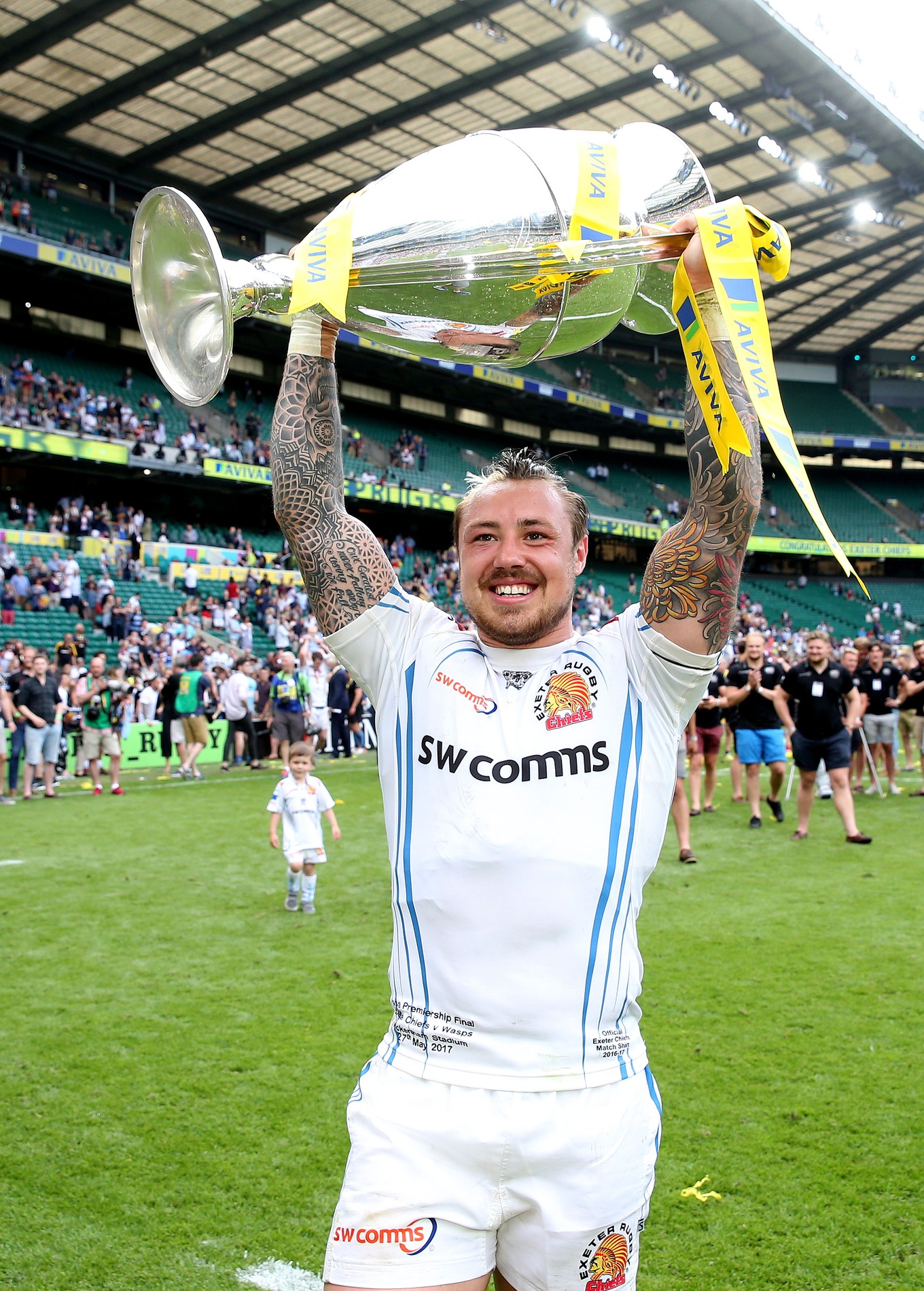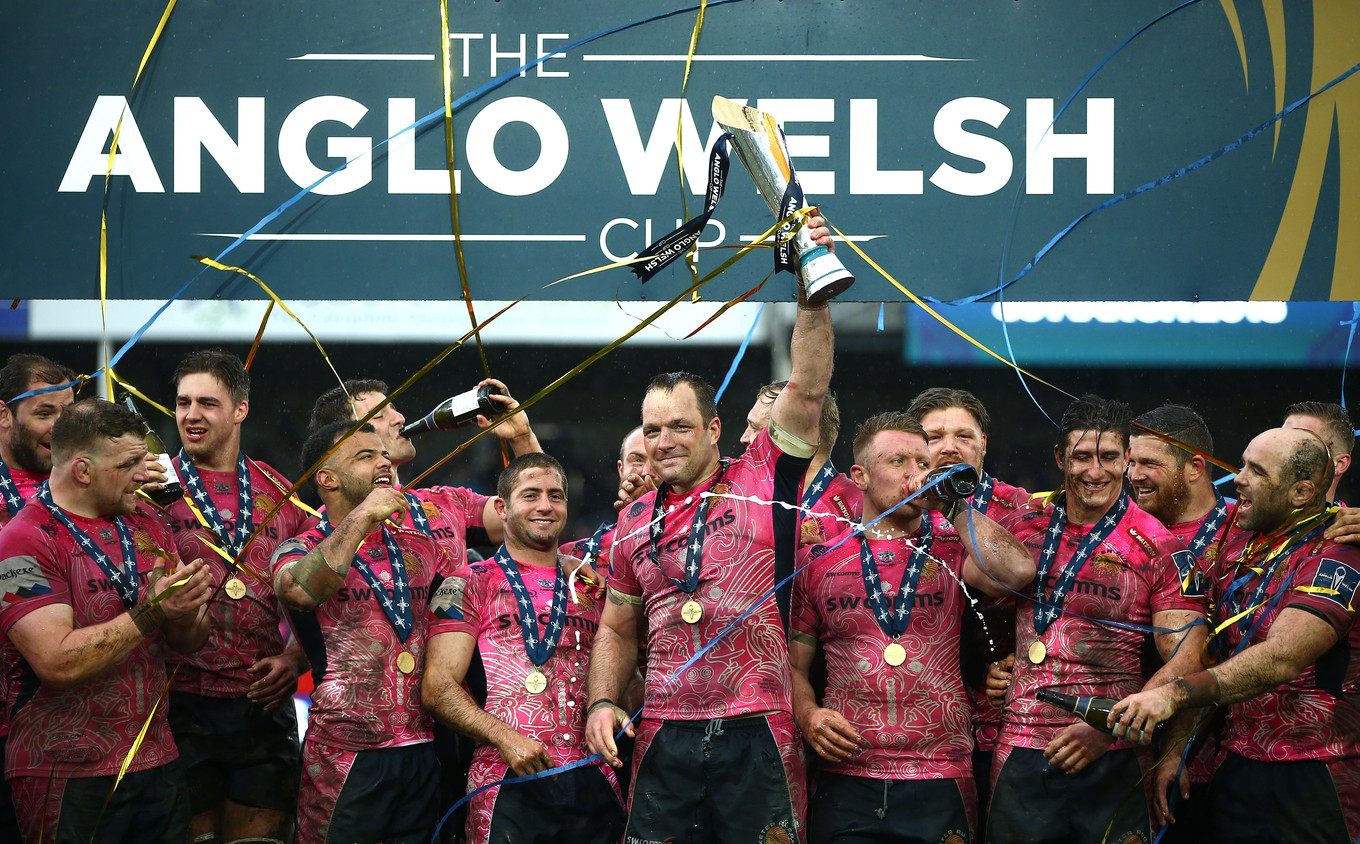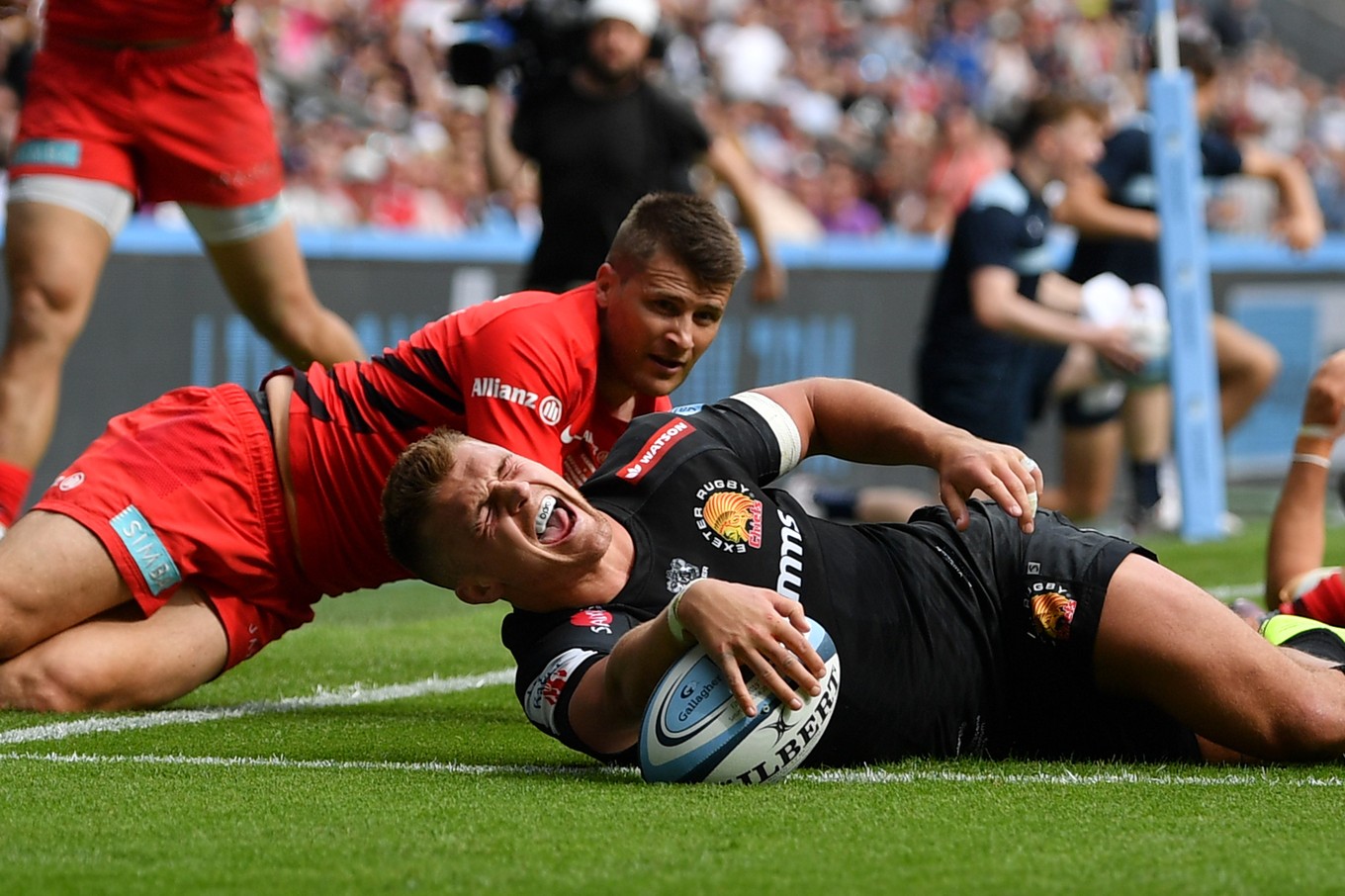
Initially formed as early as 1871, it was in the October of 1872 that the club was officially founded, with the first recorded match of Exeter Rugby against the training college (latterly St Luke’s) on October 26, 1873 – playing in a field belonging to Mr Morrison and then in the Militia Field behind the barracks.
Subsequently, the club went to the Cricket Field at St Thomas (the former County Ground) then Matford only to return to the County Ground, where they would stay until the culmination of the 2005/06 season.
Throughout its many years of existence, Exeter Rugby Club has not only helped forge the careers of many fine individuals players, some of whom have gone on to achieve international honours, but its long-lasting traditions of sportsmanship, honour and team work have continued to move throughout the many years.
To list the efforts of players throughout the decades would surely be an endless task, but the way the Devon club has moved with the times – now featuring amongst English and European Rugby’s elite teams – is something to be truly cherished.
The progression made, particularly over the past 20 years is certainly notable, and having moved away from their former base at the County Ground, Exeter Rugby Club are now regularly playing host to crowds of almost 11,000 spectators.
Much of the transformation of Exeter Rugby Club has happened since the English rugby scene turned professional in the late 1990s. At this time a limited company structure was created to run all of the club’s affairs through a board of seven directors, chaired by local businessman Tony Rowe.
It was an inspired move as the direction of the new board not only saw Exeter Rugby Club rise on the field, but off it as well there was also much to promote as individuals, businesses and key sponsors came together to help provide financial backing to the playing squad.
Even now, however, it remains a members’ club with the company shares held by four trustees – John Lockyer, Bob Staddon, Paul Derbyshire and Ian Pugsley – who act on the sole wishes of the 700-strong membership.
The need, though, to grow the club and the business has advanced at some pace and having rebranded the club in 1999 to that of the Exeter Chiefs, Devon’s finest have made significant progress.
Former Director of Rugby, Ian Bremner, oversaw the early years of the semi-professional era at the County Ground when the Chiefs would regularly challenge for the top division, only to be pipped by sides such as Leeds Tykes, Rotherham and Worcester.
The Irishman’s input was hugely beneficial and although his time in charge eventually came to an end in 2006, the Chiefs were already moving in the right direction with a new stadium on the outskirts of the city approved and a former player, Pete Drewett, set to take charge of a new-look and full-time squad.
Former England Under-20s team manager Pete Drewett took charge in 2006, the same year as the club moved into their new, state-of-the-art stadium at Sandy Park. Ironically, they opened up at their new home with a 13-13 draw against Coventry, the opponents they faced in their final outing at the old County Ground.
Drewett’s first year ended with the Chiefs finishing fourth in the standings, but improvements followed as the Chiefs recorded back-to-back second place finishes. The trouble was, however, that in both those years they came behind former top flight clubs Northampton Saints and Leeds in the race to join the Premiership.
The need to get into the promised land of the Premiership prove too much for Drewett, who was relieved of his duties – along with fellow coach Paul Larkin – in March 2009 following Exeter’s 32-24 defeat at Moseley.
Former England international Robin Cowling assumed control of on-field matters, along with former players Bob Staddon and Rob Baxter for the remainder of the season, before Baxter was then installed as Head Coach for the 2009/10 season.
Immediately, Baxter recruited the services of former Northampton and England fly-half Ali Hepher as his assistant, whilst another former Exeter player, Ricky Pellow, was drafted in as skills coach. Together the group gelled instantly in the new-look RFU Championship, which had taken over from the old National League One.
Although the Chiefs had finished the normal season as runners-up to near neighbours Bristol, the two would subsequently progress through the latter stages to the first-ever Play-Off final, the victors of whom would advance into the Premiership.
After a tight first leg and in front of a record crowd at Sandy Park, the Chiefs held a narrow 9-6 lead thanks to three penalties from Irishman Gareth Steenson.
With pundits giving the Chiefs little hope ahead of the second leg, the tactical nous of Baxter and his trusty lieutenants came to the fore when, on a cold and wet night at the Memorial Stadium, they crushed their more established rivals 29-10 thanks to a last-minute try from Simon Alcott and the boot of Steenson.
As the champagne flowed, the dream of Premiership Rugby had been realised and the hard work was just about to begin for Baxter, his staff and his players – many of whom had never experienced life in the top division before.
Given little hope of survival by anyone outside the confines of Sandy Park, the Chiefs marked their introduction to life another run up the ladder by producing a stunning opening day win over Gloucester.
It was the first of 10 league wins the Chiefs would produce during the season as Baxter’s newcomers – who would eventually finish in eighth place – also claimed the prized scalps of established sides such as Newcastle Falcons, Saracens, Leeds, Harlequins, London Wasps, Sale Sharks and Northampton Saints.
Exeter’s first foray into Europe also brought rewards with victories over Bourgoin and Newcastle, although Montpellier would triumph in both encounters.
Having exceeded expectations in their debut year, again there was much talk ahead of the new season as to whether the Chiefs could match their achievements. Again some wise recruitment during the off season from Baxter paid dividends as the new stock – coupled with the ever-improving efforts of much of his Championship-winning squad – saw the club advance yet further.
Come the end of another exciting year, the Chiefs had not only collected 12 Premiership wins – including memorable wins on the road against Gloucester and Worcester Warriors – but their fifth place finish had also secured themselves a place amongst Europe’s top clubs in the Heineken Cup.
The Chiefs were now entering into new and unchartered waters as they prepared for the 2012/13 season, where not only the might of the Premiership awaited them, but also Europe where they were paired against heavyweights sides Leinster, Clermont Auvergne and Scarlets.
Although it would prove a tough baptism amongst Europe’s elite clubs, the Chiefs proved on more than one occasion that they were capable of mixing it with the very best, including picking up home and away victories over the Scarlets, as well as running defending champions Leinster to within a score in both fixtures.
Domestically, the Chiefs continued to prosper within the Premiership where they were again able to secure another top six finish, which included an impressive last-day victory over Gloucester at Sandy Park.
The 2013/14 season will forever be etched into the memories of Exeter supporters as this was the campaign in which the Chiefs finally secured their first piece of major silverware. Victory on home soil against a strong Northampton Saints side saw Rob Baxter’s men lift the LV= Cup for the first time thanks to a 15-9 victory.
Skipper Dean Mumm and Chris Whitehead claimed the all important tries, whilst rising fly-half Henry Slade slotted the other five points with a penalty and a conversion. Sadly, that would prove to be Whitehead’s final game in club colours as he was one of three players – Tom Hayes and James Hanks the others – who would be forced to retire prematurely through the course of the season due to injury.
All three had indeed played their part in the club’s recent rise to success and the loss of the trio was felt on and off the field as the Chiefs ended the Premiership campaign in eighth place. It meant they missed out on qualification for the new-look top tier of European Rugby, but head coach Baxter admitted the strain of trying to compete on three fronts had ultimately taken it’s toll on his ever-improving squad.
Highlights of the year included a full England debut for Jack Nowell, who together with Tom Johnson helped their country to finish runners-up in the Six Nations. Sam Hill, Dave Ewers, Dave Lewis and Slade would all go on to claim representative honours with England during the course of the season, whilst young flanker Joel Conlon was able to claim his second Junior World Championship medal as he helped England Under-20s defend their title with victory over South Africa in Auckland.
Having secured their first piece of domestic silverware, the 2014/15 season was to see even more progress at Sandy Park, both on and off the field.
During the close season the stadium itself underwent a huge £12 million redevelopment, doubling capacity in the West Grandstand and East Terrace, as well as the introduction of a new Desso-made playing surface that allowed the team to not only play, but also training fully on the pitch.
Ahead of the new season, Baxter had bolstered his ranks with a number of new faces, including England international Thomas Waldrom from league rivals Leicester Tigers.
The all-action No.8 was to enjoy a stellar first season in the Westcountry, finishing the season with 17 tries (16 of them in the Premiership) and helping the club to finish a best-ever fifth in the final standings, narrowly missing out on the end of season play-offs on points difference.
As well as an outstanding league season, the Chiefs came within a whisker of reclaiming their LV= Cup title, going down to the final kick of the game against Saracens at Northampton, whilst the club also advanced to a first-ever European semi-final only to be undone by eventual Challenge Cup winners Gloucester at Kingsholm.
On the field, Jack Nowell continued to thrive at international level, whilst England head coach Stuart Lancaster also awarded Saxons call-ups for Henry Slade, Waldrom, Luke Cowan-Dickie and Dave Ewers.
Slade and Ewers, together with Tomas Francis and departing skipper Dean Mumm, were all selected for the BT Sport Dream Team of the Year at the annual awards night, whilst Waldrom collected the league’s top try-scorer award and Slade followed up his prize of winning the RPA Young Player of the Year title with a similar accolade at the Premiership night.
Having narrowly missed out on the Premiership play-offs, the Chiefs reported back for the 2015/16 determined to build on the previous campaign and establish themselves firmly as one of English rugby’s top four clubs.
Buoyed by the arrivals of key names such as England and British Lions lock Geoff Parling, Italian international Michele Campagnaro, Aussie flanker Julian Salvi and Bath flyer Ollie Woodburn, the season didn’t get off to the best of starts when they were undone narrowly on the opening day by rivals Bath.
However, Baxter’s side would quickly recover, producing a season that delivered on all fronts. Not only did the Chiefs advance to the last eight of the European Champions Cup for the first time following a dramatic last day of action in January, but they would also go on to secure their place in the end of season play-offs for the first time.
Undone by rivals Wasps in European battle, the Devonians gained their revenge in the final few weeks of the season, defeating the big-spending Midlanders twice – the second time the play-off semi-finals – to advance to Twickenham for the main Premiership final.
Standing in their way were Saracens, who just took weeks earlier had already been crowned ‘Kings of Lyon’ having lifted the Champions Cup over Racing Metro 92.
Spurred on by thousands in the travelling tribe, the first half at Rugby HQ didn’t quite go to plan for the Chiefs, who trailed 23-6 to the much-fancied Londoners. The second half, however, was another thing all together and back they roared courtesy of converted tries from Jack Yeandle and Jack Nowell. With just three points separating the two sides heading into the last few minutes of the match, it was Saracens who delivered the knockout blow when man of the match Alex Goode claimed a late try to secure victory.
Although gutted with the outcome, the Chiefs had underlined their growing emergence within the game with an outstanding display. Head coach Rob Baxter admitted afterwards that his side would learn from the whole experience, insisting they would be back all the more stronger in 2016/17.
Off the field, the Chiefs continued to pick up honours aplenty with Thomas Waldrom (top try-scorer) and Gareth Steenson (top points-scorer) picking up awards at the Premiership’s annual dinner. Steenson and Don Armand were also shortlisted for the division’s Player of the Year accolade, while Rob Baxter himself was among those nominated for the Director of Rugby prize.
Steenson and Nowell were both named in the BT Sport Dream Team of the season following outstanding campaigns and Nowell was among three Exeter players – Slade and Cowan-Dickie the others – who were part of England’s highly successful summer tour to Australia, where England emerged 3-0 victors following tests in Brisbane, Melbourne and Sydney.
Looking to build on the previous year, things did not start brightly for the Chiefs at the start of the 2016/17 campaign as they lost seven of their opening 10 games in all competitions to leave them not only languishing at the wrong end of the table, but also facing a huge uphill struggle in terms of their European aspirations.
A heavy home loss to Clermont-Auvergne, plus a last-gasp defeat at Sandy Park to rivals Bath at the end of October were to prove a turning point in the season. Having not really put a full stop on the previous year, Baxter and his team rallied in the wake of these setbacks to produce a stunning run of results that would ultimately lead them back to Twickenham.
After the Bath loss, the Chiefs would not lose again in the top flight, finishing the scheduled season in second place and riding high on confidence as they prepared to welcome champions Saracens into town.
In a pulsating encounter, played out in front of a capacity crowd, the game ebbed and flowed before the Chiefs delivered a telling blow in the final minute. Having just surrendered the lead just minutes earlier, Slade delivered one of the great touch-finder kicks the Premiership has ever seen to put his side in sight of the line. Literally in the last-chance saloon, the Exeter eight formed together to propel young Sam Simmonds over the line for a match-winning score.
Returning to Twickenham for a second successive season, this was a much different Chiefs that arrived in the capital. Whereas 12 months earlier they may have been happy to mix it on English rugby’s greatest stage, this time nothing less than victory would suffice for Devon’s finest.
With lessons learnt from the previous year, the Chiefs started well storming in front thanks to tries from Nowell and Phil Dollman. Wasps, however, rallied and stung Baxter’s side with a blitz of scores from Jimmy Gopperth and Elliot Daly.
As the minutes ticked by, it was Wasps who held a slender lead. That was until the Chiefs were given a lifeline in the dying minutes when Nathan Hughes infringed. Not for the first time in his career, Steenson stepped forward to drill a sublime penalty between the posts.
Level at full-time, it was the Chiefs who looked the stronger in the searing heat of extra time. Spurred on by thousands from the travelling tribe, the decisive moment came late in the second half of added on time. With Simmonds denied a try by the TV match official, the Chiefs used the resultant five metre scrum to win another penalty.
Offered the golden ticket, Steenson grabbed it with both hands, landing the decisive penalty that ensured a first-ever Premiership title was heading its way to Devon.
Unbelievable scenes both that day – and in the days that followed – helped to mark the occasion and put the Chiefs firmly top of the tree in terms of English rugby.
Days later, Nowell would go on to become the club’s first-ever British & Irish Lion when he featured twice off the bench in their series draw with world champions New Zealand, whilst on the international scene a busy summer saw England hand first caps to the Exeter trio of Don Armand, Jack Maunder and Harry Williams.
Baxter’s efforts in leading the club to title success were also rewarded when he was handed a Honorary Degree by the University of Exeter, whilst the city itself marked his achievements by offering him the Freedom of the City.
Having been crowned champions for the first time in the club's history, Baxter's side came back the following year hellbent on trying to make it back-to-back Premiership successes.
Now, however, they had a much bigger target on their backs and that was illustrated on the opening night of the season as Gloucester grabbed a last-gasp victory at Kingsholm when New Zealander Jason Woodward darted over in the final minute of the match.
That would be just one of five defeats the Chiefs would suffer from their 22 regular season fixtures. With just one defeat on home soil - that was against Worcester Warriors in a low-scoring affair at Sandy Park - the Devonians again had home advantage in the end of season semi-finals, having secured top spot in the table by eight points from Saracens.
It set up a testing last four showdown with surprise package Newcastle Falcons, but Exeter's big-game experience and home advantage would prove telling as they saw off Dean Richards' side to seal a third successive trip to the capital to decide the Premiership champions.
Although the Chiefs came into the game full of confidence and on great form, they struggled to handle the power, pace and precision of two-time European champions Saracens, who denied them of glory with a 27-10 victory in front of over 75,000 fans at Twickenham.
The season, though, was still deemed a huge success for Baxter and his side as not only did they again create records in the Premiership, but the club also secured a second Anglo-Welsh Cup success when they beat Bath 28-11 at Kingsholm. Tries from Jack Innard and Toby Salmon, coupled with 11 points from the boot of fly-half Joe Simmonds proved decisive on the day.
In Europe, Exeter started their campaign in style with victories at home to Glasgow Warriors and away to Montpellier, but defeats to Leinster in the December double-header left them with plenty of work to do heading into the New Year. Thankfully, the Chiefs rose to the task defeating Montpellier on home soil, but needing a win to secure a place in the last eight, Baxter's side were undone by the Warriors in a bitterly cold Glasgow, ending their hopes of advancing for another year.
The on-field success of the Chiefs was noticed by the England selectors with Henry Slade, Alec Hepburn, Sam Simmonds, Jonny Hill and Harry Williams all travelling to South Africa for their summer tour, while elsewhere Italian centre Michele Campagnaro and Welsh prop Tomas Francis added to their tally of international caps.
With the hurt of defeat at Twickenham still lingering when the Chiefs reported back for pre-season, it was a clearly focused Exeter squad that gathered ahead of the 2018/19 campaign.
Wales and British Lions winger Alex Cuthbert was the stand-out new addition to Baxter's first-team mix, having joined the Devonians from Welsh region Cardiff Blues.
After a decent pre-season programme, the Chiefs kicked off the new Gallagher Premiership year in style, thumping Leicester Tigers 40-6 on the opening day. It was a display that spelt out the club's intentions for the season ahead and also spelt the end for Tigers coach Matt O'Connor after just one week of the season.
Baxter's side would win their opening six league fixtures, placing them at the summit of the table, a position they would hold for nigh on the whole campaign.
In Europe, Exeter's latest Champions Cup campaign kicked off with a first meeting against Munster, which ended in a 10-10 draw at Sandy Park, after which they slipped to defeat to reigning French Top 14 champions Castres.
The new-look Premiership Rugby Cup went well enough for the defending champions, the Chiefs drawing at Newcastle in Round One before home victories over Bath and Harlequins, but although they would defeat Bristol Bears in their final outing later in the season, ensuring they finished the qualifying stages unbeaten, they missed out on the last four on points' difference.
Whilst there would be few issues in terms of the Premiership as the season progressed, defeat at home to Gloucester in the Champions Cup meant Baxter's side were forced onto the back foot at the halfway stage. Thankfully, his side recovered well defeating Gloucester (away) and Castres (home), setting up a winners-takes-all encounter at Thomond Park against European greats Munster. Knowing nothing less than victory would do, the Chiefs threw everything at their Irish hosts, who somehow held off a spirited fight from the Devonians to win 9-7.
Come April, the Chiefs were ruling the roost in the Premiership, booking their semi-final place in record-breaking time with victory away to Leicester Tigers. Early qualification meant Baxter was able to rotate his options over the final weeks of the regular season, ensuring his squad were in fine fettle for their last four meeting against Northampton at Sandy Park. Having defeated the Saints the previous week in Round 22, the Chiefs again turned on the style notching up another 40+ score to ensue they were heading back to Twickenham for a fourth successive season.
Again, glorious conditions shone through for the end of season showpiece between the Chiefs and recently-crowned European champions Saracens.
Having finished the campaign eight points ahead of the Londoners, hopes were high that Baxter's side could finish the job and replicate their success of 2017 at the home of English rugby.
Nic White's try after just 27 seconds - a record for the final - gave the Chiefs the perfect start to the contest between these two English heavyweight clubs. And by half-time Baxter's side were sitting pretty as they 22-16.
With thousands making up the Travelling Tribe, things would get even better for the Chiefs as they extended their lead to 11 points on the hour mark with a fourth try through England international Henry Slade.
Then, however, Saracens kicked into life, strangling the Chiefs into submission. The loss of White and Jack Nowell did little to help Exeter's cause in the final quarter, but it was Mark McCall's men who somehow found a way to clinch success in what was arguably the greatest final of all time.
On the international front, the Chiefs enjoyed their most successful season to date. Tomas Francis headed up the honours by helping Wales to Grand Slam glory in the Six Nations, which also included appearances for Jack Nowell, Henry Slade, Harry Williams, Luke Cowan-Dickie, Alec Hepburn and long-serving prop Ben Moon in England colours, as well as a Scotland debut for Sam Skinner, a product of the club's highly-successful academy programme.
Equally highly-rated youngsters Richard Capstick, James Kenny, Sam Maunder, Alfie Petch and Rus Tuima were all part of the England Under-20s squad that featured in the Six Nations and the Junior World Championships in Argentina.
Having narrowly missed out on title success the previous season, the Chiefs entered into the 2019/20 campaign determined to go one step better than they had 12 months earlier.
With their frontline stars such as Henry Slade, Jack Nowell, Luke Cowan-Dickie, Tomas Francis and new signing Stuart Hogg all away on international duty at the Rugby World Cup in Japan, the Chiefs started the season brightly and quickly set about laying down their marker. Premiership form was decent enough, whilst an impressive away victory in Round One of the Champions Cup at La Rochelle signalled the intent of the Devonians in terms of their European aspirations.
On both fronts, Rob Baxter's side were progressing nicely, that was until the world came to a standstill in March, with the outbreak of Covid-19. The pandemic brought a halt to life for everyone and it would be months before the Chiefs would take to the field again. When they did in August 2020, the time and effort that the squad had put in during lockdown came to the fore as the Chiefs quickly dispatched of their rivals.
Playing in empty stadiums and with games coming thick and fast, the Chiefs continued to prosper, booking not only a fifth successive Premiership Final appearance, but also a first-ever Champions Cup Final appearance as well.
Instead of battling for Europe's top prize in Marseille, the Chiefs had to make only the short trip up the M5 to Bristol, where they faced a star-studded Racing 92 side at Ashton Gate. In what was one of the classic European finals of all time, tries from Luke Cowan-Dickie, Harry Williams, Henry Slade and European Player of the Year, Sam Simmonds, guided the Chiefs to a memorable 31-27 triumph.
In just the space of ten years, the Chiefs had gone from plying their trade in English Rugby's second tier to that of becoming Kings of Europe.
Two weeks later - and they would be celebrating again - this time a historic double as they overcame rivals Wasps to land their second Premiership title at a rain-sodden Twickenham.
Henry Slade's first half try, coupled with 14 points from skipper Joe Simmonds, proved sufficient enough for Rob Baxter's side to seal a 19-13 victory.
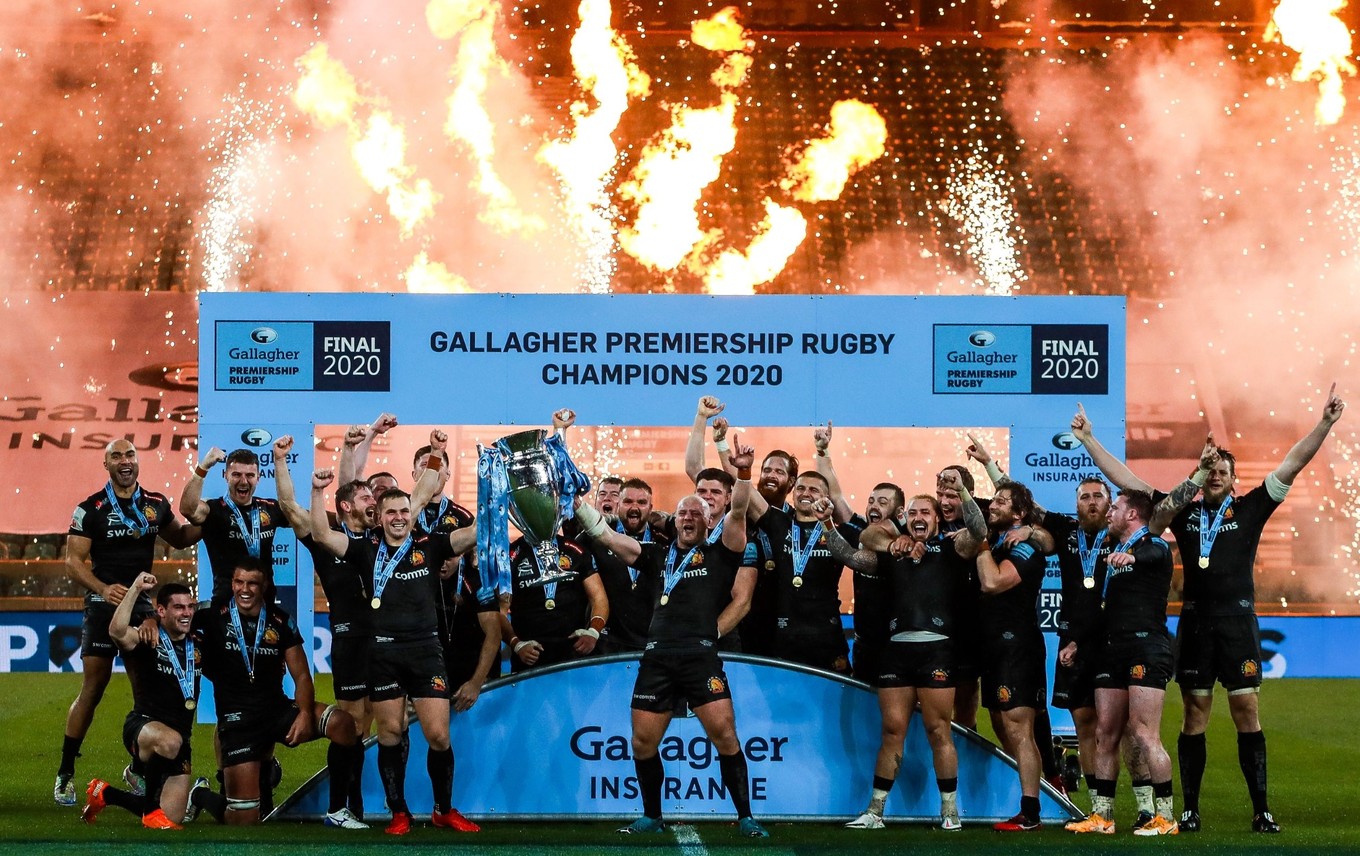
Heading into the 2020/21 season, the Chiefs were the marked men, not just of the English game, but also in European. Just weeks after winning against Wasps to land their second Premiership crown, the Chiefs were back at Twickenham - albeit across the road - to face Harlequins in their seasonal opener at The Stoop.
Still very much fighting fit following their exertions of the previous campaign, Baxter's side began their title defence with a bang, Sam Simmonds scoring a hat-trick in Round One to guide them to a hugely impressive 33-3 victory. Further wins over Bath and Leicester Tigers followed, before they kicked off their European defence with a 42-0 hammering of Glasgow Warriors at Sandy Park.
Within a week, the European aspirations had hit a considerable hurdle when the Chiefs were forced to concede their game against Toulouse due to a mass outbreak of Covid-19 within the camp. It was a hammer blow for the defending champions and left them unsure as to what the future would hold in terms of advancing within the competition.
On the field, form started to deep somewhat as they lost on the road at both Wasps and Bristol Bears, before the decision was made to cancel the final two rounds of Europe due to the ongoing issues surrounding the pandemic. With European organisers forced to look into a new plan for the resumption of the tournament in the New Year, the Chiefs were grateful of the five points they had accrued from defeating the Scotsmen in Round One.
In the Premiership, Baxter's side were soon back up and running and would remain amongst the division's top two for the remainder of the season. Bristol were the frontrunners, but Sale Sharks - now with Alex Sanderson in charge - remained a continual threat on the shoulders of the Chiefs.
European action retuned in April with the Chiefs seeing off Lyon 47-25 at Sandy Park, before four-times winners Leinster burst Baxter's bubble a week later when they headed back across the Irish Sea with a 34-22 triumph.
Exeter's exit meant their sole focus for the remainder of the campaign would be that of the Premiership - and they continued to advance ever closer to the capital with some notable displays. Indeed, victories over Northampton Saints and Sale Sharks in the final two weeks of the season meant they would again have home advantage in the last four against the Sharks, who were unable to put up the same kind of fight as that of the previous week, eventually going down 40-30 in the last four.
Back at Twickenham for a sixth successive final, the stage was set for the Chiefs to replicate their glory of the previous year. Sadly, Harlequins - who had come from nowhere having sacked head coach Paul Gustard back in January - had clearly not read the script. It what will go down as one of the best finals ever staged, it was the Londoners who prevailed, sinking Baxter's side 40-38.
A day later, four of those on duty at Rugby HQ - Luke Cowan-Dickie, Stuart Hogg, Jonny Hill and Sam Simmonds - were boarding a plane for South Africa, as they formed part of Warren Gatland's 37-man squad for their summer tour against the world champions.
All four would figure against the Golden Lions, as well as the DHL Stormers, before Cowan-Dickie and Hogg were given the nod for starting spots in the first two Test matches.
The 2020/21 season also saw the creation of the Exeter Chiefs Women's side, headed up by coach Susie Appleby, who brought together a wealth of international talent from around the world to tackle the demands of the Allianz Premier 15s.
Although they went down in their opening game of the new season away to Gloucester-Hartpury, the initial signs were encouraging and as the weeks and months ticked by, so the Chiefs Women started to make their mark against some of the game's household names.
American duo Kate Zackary and Gabby Cantorna were at the heart of the good work, as was Dutch skipper Linde van der Velden, Japanese prop Sachiko Kato and the likes of Spanish duo Patricia Garcia and Laura Delgado.
Equally, homegrown English talent was very much to the fore with Flo Robinson and Merryn Doidge both being called up by the England Women's team by the end of the season.
As a collective, the Chiefs Women were growing by the week and come the end of the season had defeated all of the top four, which comprised Saracens, Wasps, Loughborough Lightning and eventual champions Harlequins. Their eventual placing of sixth was a highly creditable placing given the short amount of time Appleby had to put her squad together. Add in the ongoing issues around Covid-19 and it all made for a solid foundation from which the Chiefs could build in the new season.
The following seasons saw Appleby recruit more world-class players, including a front-row consisting of Canadians DaLeaka Menin and Emily Tuttosi and Eagles prop Hope Rogers, to play alongside a core of talent England qualified individuals, including new captain Poppy Leitch and Ebony Jefferies. Younger players were also key in leading to back-to-back wins of the Allianz Cup in the 2021/22 and 2022/23 seasons.
The sad demise of several clubs, including Wasps and Warriors, meant there were a number of quality players available, including England’s Claudia MacDonald and Ireland’s Cli Moloney and Edel McMahon. With the squad expanding and confidence growing, Chiefs began to trouble the top four reaching two league semi-finals and a final in the past three seasons.
Appleby has bolstered that squad further ahead of the 2024/25 season with international players eyeing the Premiership Women’s Rugby (PWR) league as an ideal stage to get ready for the 2025 Women’s Rugby World.
